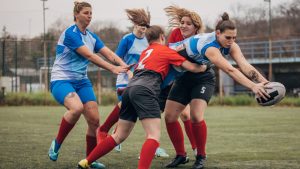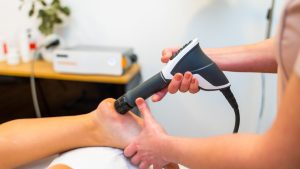The Women’s Rugby World Cup arrives in London, Twickenham this year, a landmark moment for the women’s game. I first got involved in women’s rugby in 2011, as a physiotherapist for then premiership side Wasp’s Ladies First XV. In my second season (2012/13), the RFU began auditing the injury rates of the England women’s team in collaboration with Bath University. Since the launch of the Tyrell’s Premiership in 2017/18, data collection has expanded to include all players through the Women’s Rugby Injury Surveillance Project (WRISP).
The equivalent data for the professional men’s game (Professional Rugby Injury Surveillance Project – PRISP) started in 2002/3. In the lead-up to the Women’s Rugby World Cup Finals, I thought it would be interesting to look at how the injuries in women’s rugby differ from those in men’s.
How do injury patterns in women’s rugby compare to men’s? And what can we do to reduce them?
I’ll break this down into two parts:
- Injury Analysis — women vs men
- Prevention & Treatment — my physiotherapy playbook
Part 1: Injury Analysis — Women vs Men
Match Injuries
Women (WRISP 2023/24, PWR):
- Incidence: 60.6 / 1,000 h (≈2.4 injuries per match)
- Severity: 41 days (mean)
- Burden: 2,485 days absence / 1,000 h
- Top event: Being tackled
- Top diagnosis: Knee ligament sprain
- Concussion: 13.7 / 1,000 h (23% of all injuries)
Men (PRISP 2022/23, Premiership 2023/24 is currently not available yet)
- Incidence: 76 / 1,000 h (≈1.5 injuries per team per match)
- Severity: 38 days (mean)
- Burden: 2,879 days absence / 1,000 h
- Top event: Tackling (26%) and being tackled (24%) = 50% of all injuries
- Top diagnosis: Concussion (18.4 / 1,000 h; 24% of all injuries)
Comparison:
- Incidence slightly higher in men (76 vs 60.6).
- Mean days lost similar (38 vs 41).
- Both report the tackle as the main injury event, but women show knee ligament injuries as the highest burden diagnosis, while men’s data highlight concussion.
Training Injuries
Women (WRISP 2023–24, PWR):
- Incidence: 2.74 / 1,000 h
- Severity: 50 days (mean)
- Burden: 137 days absence / 1,000 h
- Top event: Rugby skills – full contact, game-based
- Top diagnosis: Knee ligament sprain; concussion also significant
Men (PRISP 2022–23, Premiership):
- Incidence: 3.2 / 1,000 h
- Severity: 39 days (mean)
- Burden: 125 days absence / 1,000 h
- Top event: Running (34%)
- Top diagnosis: Hamstring muscle injuries (0.4 / 1,000 h; 13% of all training injuries)
Comparison:
- Incidence broadly similar (slightly higher in men).
- Women’s training injuries lasted longer (50 vs 39 days).
- Men’s training injuries lean toward hamstrings, women’s toward knees and concussions.
England National Team Data
Women (2023–24 England matches):
- Incidence: 61 / 1,000 h
- Severity: 31 days
- Burden: 1,891 days / 1,000 h
- Top site: Knee
Men (2022–23 England matches):
- Incidence: 78 / 1,000 h
- Severity: 18 days
- Burden: 1,465 days / 1,000 h
- Top site: Ankle injuries (22.3 / 1,000 h; 27% of all injuries)
Comparison:
- Match injury incidence higher in men (78 vs 61 / 1,000 h).
- Women’s injuries are longer lasting (31 vs 18 days).
- Knees dominate women’s data; ankles dominate men’s.
What this means
- Tackles are the universal problem: Half of men’s match injuries and the biggest burden in women’s.
- Concussion is major in both games: ~24% of men’s injuries and 23% of women’s.
- Women’s knees vs men’s hamstrings/ankles: Women show disproportionate knee ligament burden, while men more often see hamstring and ankle injuries.
- Severity gap: Women’s injuries last longer on average (training & matches), reflecting both biomechanical and support-structure factors.
References:
Women’s Rugby Injury Surveillance Project. WRISP 2023/24: https://keepyourbootson.co.uk/wp-content/uploads/2022/03/WRISP-2017-18.pdf
Professional Rugby Injury Surveillance Project. PRISP 2022/23: https://keepyourbootson.co.uk/wp-content/uploads/2024/04/PRISP-22-23-Report.pdf





